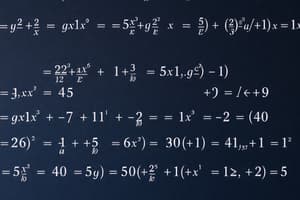Podcast
Questions and Answers
What is the general form of a quadratic equation?
What is the general form of a quadratic equation?
ax^2 + bx + c = 0
What are the steps to factorise a quadratic equation?
What are the steps to factorise a quadratic equation?
Identify coefficients, multiply a and c, find two numbers, rewrite the middle term, factor by grouping.
What are the two numbers that multiply to give ac and add up to b?
What are the two numbers that multiply to give ac and add up to b?
The two numbers are determined based on the values of a, b, and c from the quadratic equation.
If the quadratic equation is 2x^2 + 5x + 3 = 0, what are the values of a, b, and c?
If the quadratic equation is 2x^2 + 5x + 3 = 0, what are the values of a, b, and c?
What is the product ac for the equation 2x^2 + 5x + 3 = 0?
What is the product ac for the equation 2x^2 + 5x + 3 = 0?
What is the final factorisation of the equation 2x^2 + 5x + 3 = 0?
What is the final factorisation of the equation 2x^2 + 5x + 3 = 0?
How do you find the roots of a factorised quadratic equation?
How do you find the roots of a factorised quadratic equation?
What are the solutions for x in the equation (2x + 3)(x + 1) = 0?
What are the solutions for x in the equation (2x + 3)(x + 1) = 0?
The factor pairs used for factorisation must be correct for accurate solutions.
The factor pairs used for factorisation must be correct for accurate solutions.
Flashcards are hidden until you start studying
Study Notes
Factorising Quadratic Equations
- Quadratic equations are expressed in the standard form ( ax^2 + bx + c = 0 ).
- Factorisation converts a quadratic into the product of two binomials.
Steps to Factorise Quadratic Equations
- Identify coefficients: Recognize ( a ), ( b ), and ( c ) from the equation.
- Multiply ( a ) and ( c ) to find ( ac ).
- Find two numbers that:
- Multiply to ( ac )
- Sum to ( b )
- Rewrite the middle term ( bx ) using the two identified numbers.
- Group terms for factoring by common factors, resulting in two binomials.
Example
- For ( 2x^2 + 5x + 3 = 0 ):
- Coefficients: ( a = 2 ), ( b = 5 ), ( c = 3 )
- Product: ( ac = 6 ) (where ( 2 \cdot 3 = 6 ))
- Key numbers: ( 2 ) and ( 3 ) (since ( 2 \times 3 = 6 ) and ( 2 + 3 = 5 ))
- Rewrite as ( 2x^2 + 2x + 3x + 3 )
- Group: ( (2x^2 + 2x) + (3x + 3) )
- Factor out: ( 2x(x + 1) + 3(x + 1) )
- Final factorisation yields ( (2x + 3)(x + 1) = 0 )
Solving Quadratic Equations
- After factorisation into ( (px + q)(rx + s) = 0 ):
- Set each factor to zero: ( px + q = 0 ) and ( rx + s = 0 )
- Solve for ( x ) using:
- ( x = -\frac{q}{p} ) for ( px + q = 0 )
- ( x = -\frac{s}{r} ) for ( rx + s = 0 )
Example of Solving
- From ( (2x + 3)(x + 1) = 0 ):
- For ( 2x + 3 = 0 ): ( x = -\frac{3}{2} )
- For ( x + 1 = 0 ): ( x = -1 )
- Solutions to the equation are ( x = -\frac{3}{2} ) and ( x = -1 ).
Key Points
- Start by identifying the coefficients ( a ), ( b ), and ( c ).
- Ensuring accurate factor pairs is crucial for correct factorisation.
- Solutions obtained yield the roots of the quadratic equation, revealing where the quadratic intersects the x-axis.
Studying That Suits You
Use AI to generate personalized quizzes and flashcards to suit your learning preferences.




